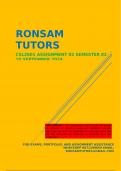RONSAM
TUTORS
CSL2601 ASSIGNMENT 02 SEMESTER 02
10 SEPTEMBER 2024
DISCLAIMER!!!: The assignments sold through this website
are intended for research, study, and reference purposes
only. They are not to be submitted as your own work. Only
use this document as reference to generate your own
assignment
FOR EXAMS, PORTFOLIO, AND ASSIGNMENT ASSISTANCE
WHATSAPP 0671189059 EMAIL:
RONSAMTUTORS@GMAIL.COM
, Question 1
To provide context, define South African constitutional law. In your own words,
with reference to provisions of the Constitution, case law and examples,
explain South African constitutional law. (10)
South African Constitutional Law can be understood as the body of law that governs
the legal principles, rules, and norms that constitute the foundation of the state’s
legal framework. It encompasses the interpretation, application, and enforcement of
the Constitution of the Republic of South Africa, 1996 ("the Constitution"), which is
the supreme law of the country. The Constitution sets out the fundamental principles
of governance, human rights, and the rule of law, and establishes the institutions of
government, their powers, functions, and limitations.
The Constitution is the central document that provides the framework for all law and
legal proceedings in South Africa. Section 2 of the Constitution explicitly states that
the Constitution is the "supreme law of the Republic," and that "law or conduct
inconsistent with it is invalid.” 1This provision establishes the Constitution as the
ultimate authority in all legal matters, overriding any conflicting statutory or common
law.
South African constitutional law also deals with the structure and functions of the
government, particularly the doctrine of the separation of powers, which divides
government authority among the legislative, executive, and judicial branches. The
separation of powers is crucial in ensuring that no single branch of government
exercises absolute power. In the landmark case of De Lange v Smuts NO, the
Constitutional Court reaffirmed that the separation of powers is an established
principle and a fundamental component of South Africa's constitutional democracy. 2
This case underscored the judiciary's role in maintaining checks and balances on the
other branches of government, highlighting the unique form of separation of powers
envisaged by the Constitution.
Furthermore, the Constitution enshrines a comprehensive Bill of Rights in Chapter 2,
which articulates the fundamental rights and freedoms of all people in South Africa.
1
Constitution of the Republic of South Africa, 1996, s 2.
2
De Lange v Smuts NO 1998 (3) SA 785 (CC).




